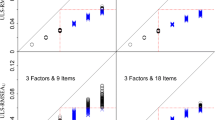Abstract
The Rasch model is an item analysis model with logistic item characteristic curves of equal slope,i.e. with constant item discriminating powers. The proposed goodness of fit test is based on a comparison between difficulties estimated from different scoregroups and over-all estimates.
Based on the within scoregroup estimates and the over-all estimates of item difficulties a conditional likelihood ratio is formed. It is shown that—2 times the logarithm of this ratio isx 2-distributed when the Rasch model is true.
The power of the proposed goodness of fit test is discussed for alternative models with logistic item characteristic curves, but unequal discriminating items from a scholastic aptitude test.
Similar content being viewed by others
References
Andersen, E. B. Asymptotic properties of conditional maximum likelihood estimators.Journal of the Royal Statistical Society, B, 1970,32, 283–301.
Andersen, E. B. The numerical solution of a set of conditional likelihood equations.Journal of the Royal Statistical Society, B, 1972,34, 42–54.
Birnbaum, A. Some latent trait models. In Lord, F. M. and Novick, M. R.Statistical theories of mental test scores. Reading: Addison-Wesley, 1968.
Lord, F. M. An application of confidence intervals and of maximum likelihood to the estimation of an examinee's ability.Psychometrika, 1953,18, 57–76.
Lord, F. M. An analysis of the verbal scholastic aptitude test using Birnbaum's three-parameter logistic model.Educational and Psychological Measurement, 1968,28, 989–1020.
Lord, F. M. and Novick, M. R.Statistical theories of mental test scores. Reading: Addison-Wesley, 1968.
Martin-Löf, P.Statistical models. Lecture notes by Rolf Sundberg. Stockholm: Institute of Mathematical Statistics, 1969. (In Swedish).
Rao, C. R.Linear statistical inference and its applications. New York: J. Wiley and Sons, 1965.
Rasch, G.Probabilistic models for some intelligence and attainment test. Copenhagen: Danish Educational Research Institute, 1960.
Rasch, G. On general laws and the meaning of measurement in psychology.Proceedings of the Fourth Berkeley Symposium on Mathematical Statistics and Probability Theory, 1961,5, 321–333.
Rasch, G. An individualistic approach to item analysis. In: Lazarsfeld, P. F. & Henry, N. W.Readings in Mathematical social sciences. Chicago: Science Research Associates, 1966. (a).
Rasch, G. An item analysis which takes individual differences into account.British Journal of Mathematical and Statistical Psychology, 1966,19, 49–57. (b).
Wilks, S. S.Mathematical statistics. New York: John Wiley and Sons, 1962.
Author information
Authors and Affiliations
Rights and permissions
About this article
Cite this article
Andersen, E.B. A goodness of fit test for the rasch model. Psychometrika 38, 123–140 (1973). https://doi.org/10.1007/BF02291180
Received:
Revised:
Issue Date:
DOI: https://doi.org/10.1007/BF02291180




